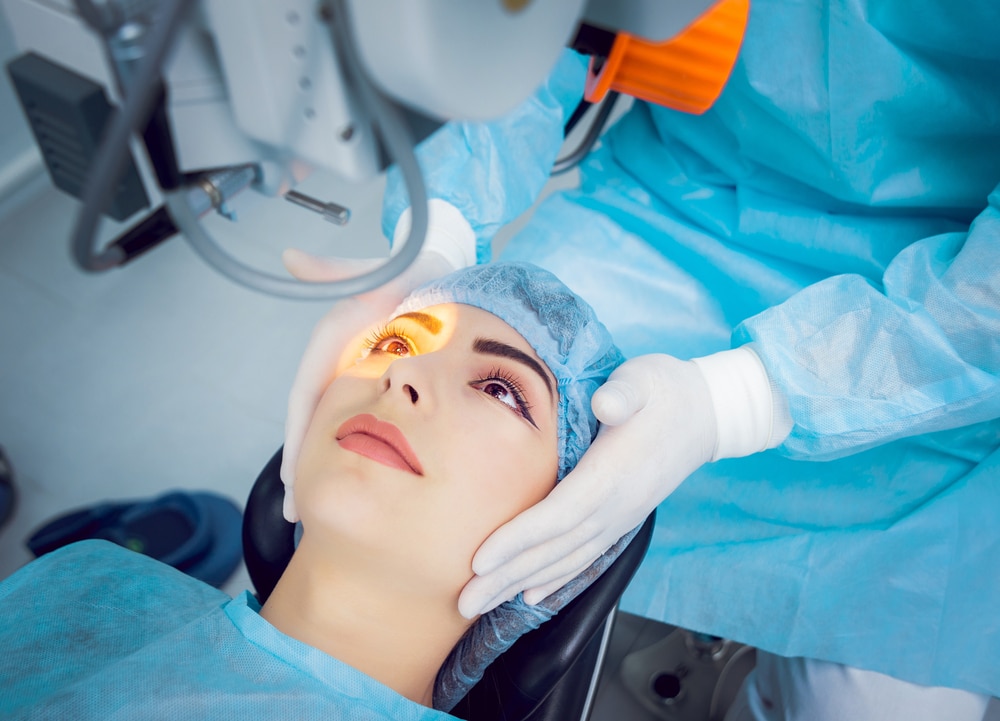Cataract surgery is one of the most common and successful surgeries performed in the United States. Most people do not experience complications and can enjoy clear vision within a couple of weeks. There should be little to no discomfort during your recovery period.
During cataract surgery, a small incision is made in the front of your eye so your eye surgeon can remove the old, cloudy lens from your eye and insert your new intraocular lens (IOL). This small incision closes, and the surface of your eye seals shut during the first 24 hours after surgery. The smooth barrier underneath your eye’s surface takes a few weeks to fully heal.
Here is what you should know about preparing for cataract surgery and what you can expect during and after the procedure, including possible complications and guidelines for a successful recovery.
How Should I Prepare For Cataract Surgery?
Before you make the decision with an eye doctor to undergo cataract surgery and schedule a surgery date, you will receive a comprehensive eye exam. Your eye doctor will:
- Check your eye health
- Look for any signs that you shouldn’t have surgery
- Determine risk factors that could complicate your surgery
- Measure your eye to find the correct focusing power for your intraocular lens (IOL)
- Tell you if you need to use prescription eye drops after surgery
During your eye exam, you should share any questions or concerns you have with your eye doctor. You might want to ask:
- What are the risks of cataract surgery for me?
- What are the benefits for me?
- What type of IOL do you recommend for me?
- Will I need glasses or contact lenses after surgery?
- How long will my recovery period be?
- When can I expect to return to my usual activities after surgery?
You won’t be able to drive right after surgery due to anesthesia, so you should also ask someone to drive you to and from your surgery.

Is Cataract Surgery Painful?
Cataract surgery is a quick, painless procedure. Your eye doctor will use numbing eye drops so you don’t feel anything during the surgery. Shortly after surgery, your eye may feel gritty or slightly tender, but over-the-counter pain medication should improve this.
What to Expect After Cataract Surgery
At the end of your surgery, your eye surgeon will tape a protective shield like an eye patch over your eye to protect it. Then, they will monitor you for 15 to 30 minutes and also schedule your first follow-up appointment. Then you can go home. Remember that you cannot drive right after surgery, and things may look blurry. Your vision will improve over the next few days and weeks.
Other temporary side effects after cataract surgery include:
- Gritty feeling in your eyes
- Red or bloodshot eyes
- Watery eyes
Recovery Time for Cataract Surgery
Full recovery takes four weeks for most people. However, people often notice improvement in their vision within a few days. There should be little pain or discomfort during this recovery period.
You don’t want to put strain on your eyes after surgery, so you should ask your doctor when you will be able to:
- Drive
- Swim
- Wear eye makeup
- Exercise
- Bend over
- Lift heavy objects
- Return to work or other usual activities
It’s a good idea to write this information down or ask your eye surgeon to write it down for you.
If your eye doctor has told you that you will need to use prescription eye drops after your surgery, be sure to follow your eye doctor’s directions on how often you need to use them during the recovery period.

Home Cataract Surgery Recovery Tips
- Use eye drops as directed by your eye doctor
- Don’t get water, shampoo, or soap in your eye
- Don’t rub or put pressure on your eye
- Wear sunglasses when you go outside
- Wear your eye shield when you sleep and other times as directed by your eye doctor
Most Common Problems During Cataract Surgery Recovery
Cataract surgery improves vision for 97% of people, and most people don’t have any complications.
But, the complications that can happen range from immediate to delayed complications following the procedure. Some immediate complications are a result of having the surgical procedure, including discomfort, bruising and swelling of the eyelid, increased intraocular pressure (IOP), and possible allergic reactions to steroid or antibiotic eye drops. These complications are monitored over time after surgery.
The most common long-term possibility of cataract surgery is posterior capsular opacification (PCO), and it can develop at any time following surgery. This is when the capsule holding your new lens becomes cloudy. It can be treated with a quick procedure called a YAG laser capsulotomy, and your vision should improve almost immediately.
Your risk of complications may be higher if you have certain eye diseases or medical conditions, and you can ask your eye doctor about these risks.
Here are some other possible risks of cataract surgery:
- Eye bleeding or swelling
- Ongoing eye pain
- Blurry vision and vision loss
- Visual disturbances, such as glare, halos, and shadows
- IOL displacement (your new lens moves out of place)
- Retinal detachment, affecting 2 in 1,000 people
- Infection, affecting fewer than 1 in 1,000 people

When to Contact Your Eye Doctor
Call your eye doctor right away if you experience any of the following symptoms:
- Eye pain or redness
- Crusting or mucous discharge around your eye
- Worsening vision or vision loss
- Eye floaters or flashers
If you need help deciding if cataract surgery is right for you, consult with the expert eye doctors at Michigan Eye Institute. Our trained eye surgeons perform a modern cataract procedure that can eliminate the need for you to use eye drops after surgery, called dropless cataract surgery. We also perform state-of-the-art laser-assisted cataract surgery to achieve the best possible outcomes for our patients.
Contact us or schedule an appointment today to discuss which option is right for your eyes.
Comments are closed.



